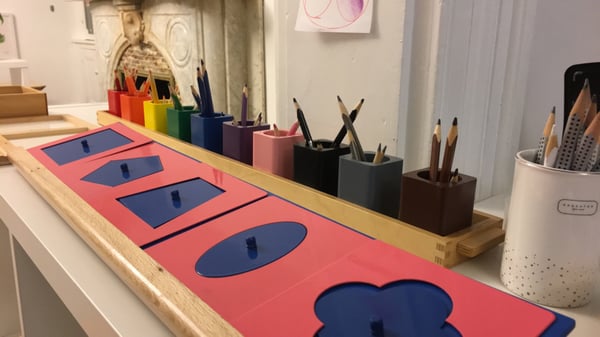 One of the fundamental aspects of the Montessori studio is the focus on order. The materials on the shelves are arranged in order from least to most complex, and work is stored in the same place (and, in some instances, in a particular sequence). From an outside perspective, the high value given to order might seem unusual or quaint. However, order is the basis for all the learning that happens in the studio. The child mentally absorbs his physical environment, and the physical environment helps a child organize her behaviors and her mind.
One of the fundamental aspects of the Montessori studio is the focus on order. The materials on the shelves are arranged in order from least to most complex, and work is stored in the same place (and, in some instances, in a particular sequence). From an outside perspective, the high value given to order might seem unusual or quaint. However, order is the basis for all the learning that happens in the studio. The child mentally absorbs his physical environment, and the physical environment helps a child organize her behaviors and her mind.
Order paves the way for a child to begin to focus and concentrate on activities in the classroom. When they know what to expect, where to find the materials that they need, and what is expected of them, children are freed to explore and can develop independence from adults.
A child in the Montessori studio has a sometimes overwhelming number of options from which to choose. The sheer number of potential choices in the classroom are manageable when work is organized and stored consistently. Learning how to choose work is one of the core practices in the Montessori studio that helps learners develop executive function—their ability to identify priorities and organize themselves to act successfully on them. Executive function is linked with many social and academic competence later in life.
When children are in an orderly environment and learn how to maintain it, they love to be guardians of that order! In group the other day, a learner pointed out that one bead chain was not put back properly and asked to fix it. Children notice when a familiar object is missing from its shelf or in an incorrect place. As children internalize a stable, ordered world, they will seek to recreate it and take care of it. This is the foundation of self-discipline, concentration, and a clear sense of place and belonging. Order is the hidden hero of the studio!